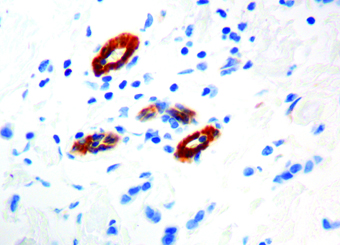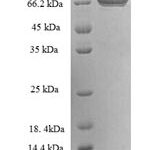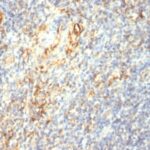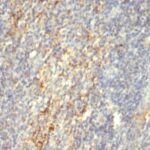Antibody (Suitable for clinical applications)
| Specification | Recommendation |
|---|---|
| Recommended Dilution (Conc) | 1:50-1:75 |
| Pretreatment | Citrate Buffer pH 6.0 |
| Incubation Parameters | 30 min at Room Temperature |
Prior to use, inspect vial for the presence of any precipitate or other unusual physical properties. These can indicate that the antibody has degraded and is no longer suitable for patient samples. Please run positive and negative controls simultaneously with all patient samples to account and control for errors in laboratory procedure. Use of methods or materials not recommended by enQuire Bio including change to dilution range and detection system should be routinely validated by the user.
Transglutaminase II Information for Pathologists
Summary:
Transglutaminase II has been implicated in programmed cell death, signal transduction, drug-resistance, cell growth, endocytosis, insulin secretion, cell adhesion, cataract formation, and wound healing.
Common Uses By Pathologists:
Different tissues and cell types express varying amounts of tissue transglutaminase with a markedly hugh expression in rheumatoid lesions.
| Transglutaminase II General Information | |
|---|---|
| Alternate Names | |
| Molecular Weight | |
| 77.3 kDa | |
| Chromosomal Location | |
| q11.23 [chr: 20] [chr_start: 38127385] [chr_end: 38166578] [strand: -1] | |
| Curated Database and Bioinformatic Data | |
| Gene Symbol | TGM2 |
| Entrez Gene ID | 7052 |
| RefSeq Protein Accession(s) | NP_004604; NP_001310245; NP_945189; XP_011527330 |
| RefSeq mRNA Accession(s) | NM_198951; NM_001323316; NM_001323317; NM_004613; XM_011529028; NM_001323318 |
| RefSeq Genomic Accession(s) | NC_000020 |
| UniProt ID(s) | P21980 |
| PharmGKB ID(s) | PA36491 |
| KEGG Gene ID(s) | hsa:7052 |
| General Description of Transglutaminase II . | |
| This antibody reacts with a 77-85 kDa protein known as transglutaminase II (TGase II). TGase II catalyzes calcium-dependent post-translational modification of proteins by formation of an isopeptide bond within or between polypeptide chains. Different tissue and cell types express varying amounts of tissue transglutaminase. | |







There are no reviews yet.